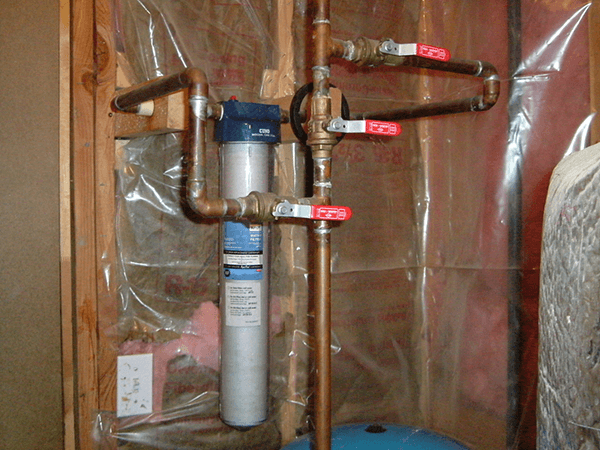Whole House Water Filtration Makes Good Sense!
Just like the air that we breathe in our homes, making sure that the water we drink, bathe in, and wash with is clean and healthy is very important. Let’s take a brief look at why, and introduce you to the types of products used to help improve your indoor water quality.
What’s In Our Household Water?
 Whether your household water supply initially comes from a lake, river, well, or a nearby glacier, there’s a strong likelihood that the water contains some level of undesirable contaminant, even after it has been treated by the local municipality. Contaminants found in residential drinking water may range from naturally occurring, scale-producing minerals present in the environment, to a variety of man-made chemicals such as chlorine. In some cases, there could even be varying levels of disease-producing pathogens, industrial waste or local runoff byproducts.
Whether your household water supply initially comes from a lake, river, well, or a nearby glacier, there’s a strong likelihood that the water contains some level of undesirable contaminant, even after it has been treated by the local municipality. Contaminants found in residential drinking water may range from naturally occurring, scale-producing minerals present in the environment, to a variety of man-made chemicals such as chlorine. In some cases, there could even be varying levels of disease-producing pathogens, industrial waste or local runoff byproducts.
While many of these contaminants may not be present in your water, or are present in very low levels, posing no immediate health concern, protecting your family from potential long term effects dictates that a wise homeowner take a closer look at whole-house water filtration.
What Are The Advantages of Water Filtration For Your Home?
Even if your locally treated water supply has eliminated virtually all government-recognized health concerns from your water, there are still advantages to be had from the extra protection provided by a quality whole-house water filter or water treatment system:
- Cleaner, healthier drinking water at every tap in your home.
- Cleaner dishes from your dishwasher or hand dishwashing.
- Cleaner, healthier hair and skin when you bathe.
- Softer, cleaner, fresher smelling clothes from your laundry.
- Enhanced protection against long-term mineral deposits in your plumbing system, extending the life of all water-using appliances, faucet and shower aerators, and piping in your home.
- Removal of potential respiratory irritants that can find their way into your indoor air from the water in your home (think allergies and asthma!).
- Failsafe protection against breakdowns in your community’s municipal water treatment system.
Of special note, compared to point-of-use water filters, whole-house filters are more effective because filtering water at lower temperatures, when it first enters your home, facilitates more effective removal of chlorine and other chemicals.
Which Water Filter Makes Sense For My Family?
 The first step in recommending a water filter for your home is understanding what issues should be addressed. A variety of quality, field-usable test kits and hand-held electronic meters can be used to analyze your water. Many common issues such as mineral hardness (calcium), iron, rust, chlorine, or other dissolved chemicals, can be identified in this manner. If greater concern exists, water samples can be sent to a professional, local laboratory for more in-depth analysis. Once the issues have been identified, specifying product options can then proceed.
The first step in recommending a water filter for your home is understanding what issues should be addressed. A variety of quality, field-usable test kits and hand-held electronic meters can be used to analyze your water. Many common issues such as mineral hardness (calcium), iron, rust, chlorine, or other dissolved chemicals, can be identified in this manner. If greater concern exists, water samples can be sent to a professional, local laboratory for more in-depth analysis. Once the issues have been identified, specifying product options can then proceed.
Choose The Right Product!
The most common type of whole-house water filters are the in-line replaceable cartridge variety that are made by a number of reputable manufacturers. Cartridges are available to address a wide range of issues including dirt, sediment and silt, rust, odor and taste, and specific chemicals. For common concerns such as sediment, the size of the particles (measured in microns) that a filter will remove can vary significantly, along with the type of material that filters are made from.
For example, for general sediment reduction, a 5 micron nominal rated water filter is a popular choice for residential applications–but this is not to be taken for granted! Depending on your issues, a different micron range, or ranges, might make more sense.
Looking a bit closer, you’ll find that there are nominal rated filters, versus absolute rated filters. Nominal rated cartridge water filters are commonly used in residential and commercial applications, whereas the ultra-effective absolute rated filters are typically found in applications such as pharmaceuticals, semiconductors, medical, or wherever even trace contaminant levels are unacceptable.
The chemical makeup of your water will help dictate what filter materials are most compatible for your needs. Common filter materials include string-wound or melt blown polypropylene plastic, nylon, and microfiber glass. Cellulose, activated charcoal (ie. carbon), and even molded ceramic are some other materials that may be employed. These broad options underscore the importance of testing your water as the first step toward making a truly informed purchasing decision.
The specific issue being addressed, the chemical makeup of your water, and the desired level of effectiveness all go into determining the optimal water filter for your home.
What About Flow Rate?
Sometimes overlooked is the flow rating of the inline water filter and housing (aka. sump) that you purchase. A great filter, with excellent particle size or chemical rating, won’t do you much good if it’s too restrictive and doesn’t allow water into your home quickly enough for you to take a decent shower or run the dishwasher! We recommend that you obtain professional advice on the appropriate flow rating that will allow all your home plumbing systems to continue operating as designed.
Other Options?
In addition to inline cartridge filters, even more effective treatment can be achieved thru the use of whole-house water softeners or reverse-osmosis (RO) filters. Generally, these are more costly products, whose performance can be expected to exceed the inline filters discussed above. In some cases, it makes all the sense in the world to consider these options. When considering water softeners and RO filters, obtain professional advice to determine if these products are appropriate for your needs. No need buying something that’s more than you really need!
In the Denver and Boulder, Colorado area, contact Save Home Heat Company for expert advice in choosing a whole-house water filter to enhance your family’s quality of life, comfort and health.




